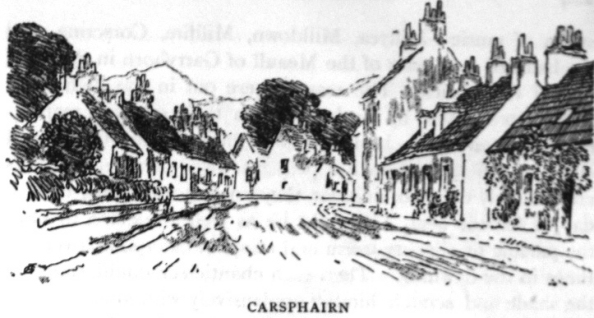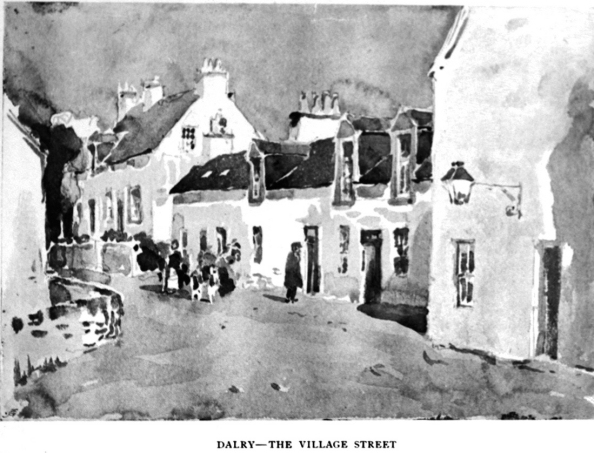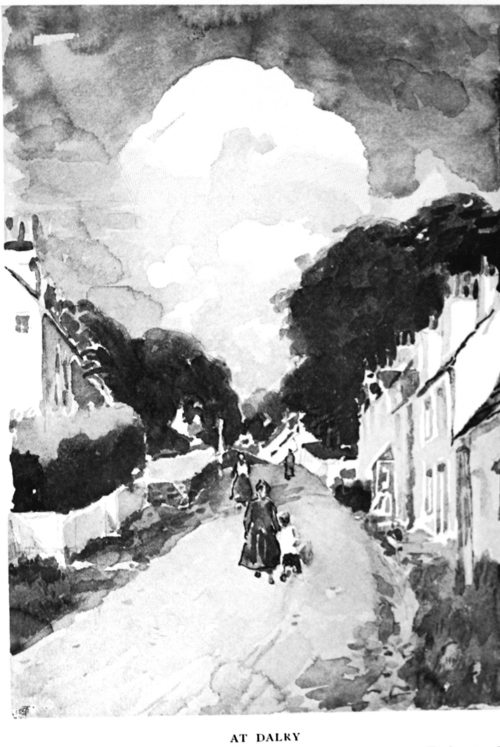|

THE GLENKENS
AND now we come to the heart of the matter. Every
traveller's road in Galloway leads him at long and last to the Glenkens –and
yet they want a railway, and set poets to ask for it!
Stormy
Music.
But we who are of the older day prefer to think of the
Glenkens as it was in the year of Bothwell Brig, when a certain William
Gordon, of Earlstoun, rode away through these sweet holms and winding paths
south toward the Duchene. Nowhere, to my thinking, is the world so gracious
as between the green woodlands of Earlstoun and the grey Duchrae Craigs. For
(writes the hero) "the pools of the Water of Ken slept, now black, now
silver, beneath us. They were deep set about with the feathers of the
birches, and had the green firs standing bravely like men-at-arms on every
rocky knoll. Then the strath opened out, and we saw Ken flow silver-clear
between the greenest and floweriest banks in the world. The Black Craig of
Dee loomed on our right side as we rode, sulky after the burning of last
year's heather. And the great Kells range sank slowly behind us, ridge
behind ridge of hills whose very names make a storm of music-Millyea,
Milldown, Millfire, Corscrine, and the haunted fastnesses of the Meaull of
Garryhom in the head end of Carsphairn. The reapers were out in the high
fields about Gordonston by daybreak, with their crooked reaping-hooks in
their hands, busily grasping the handfuls of grain and cutting them through
with a pleasant ‘risp' of sound. Cocks crowed early that morning, for they
knew it was going to be a day of fervent heat. It would be as well,
therefore, to have the pursuit of slippery worm and rampant caterpillar over
betimes in the dawning. Then each chanticleer could stand in the shade and
scratch himself applausively with alternate foot all the hot noontide, while
the wives clucked and nestled in the dusty holes along the banks,
interchanging intimate reflections upon the moral character of the giddier
and more skittish young pullets of the farmyard."
Furthermore, I have another reason for remembering the
Glenkens. It was a favourite cycling route of Sweetheart's and mine–in the
good years when cats were kittens, and dogs were puppies, and sheep were
lambs, and Sweethearts had not yet grown up!
"We skimmed under the imminent side of the Bennan Hill, now
purple and golden-brown with the heather and the dying bracken. On our
right, by the lochside of Ken, we passed the little cottage which thirty
years ago was known to all in the neighbourhood as Snuffy Point, from an
occupant who was said to use so much snuff that the lake was coloured for
half a mile round of a deep brown tint whenever he sneezed. A little farther
on is a deep tunnel of green leaves, down which we looked. It leads to
Kenmure Castle. Sweetheart and I always stop just here to dream. It seems as
if we could stretch our arms and float down into the wavering infinitude of
stirring leaves.
"In another minute we had come to the summit of the hill,
and were sliding smoothly down the long, cleanly-kept street of New
Galloway. Not a cur barked in our track–a fact so very remarkable that
Sweetheart asked why.

“' Because New Galloway is a royal burgh,' I said for a
complete answer.
“We passed the entrance to that fascinating Clattering-shaws
road, which leads through the wildest scenery that can be reached by wheels
in the south of Scotland. Soon we were steering northward along the green
holms of the Ken, and, as we looked to the west, the sun was beginning to
sit low on the horizon." 1
One may spend, as I have done, many hospitable months in
Dairy, housed somewhere in the bright smiling village clambering up its long
slope, or, better still, provided for in the comfortable Lochinvar Hotel. It
is a fine centre for excursions–yet better as a starting-place for the
hill-climber, the botanist, the photographer. There is interest on every
side–the strange, sweet solitudes of the Garpel and Jean's Waa's; the wide
moorland expanse of Lochinvar Loch, Knockman lying far up, lost among the
hills–and, best of all, the old Castle of Earlstoun, the home of Sir
Alexander Gordon, the famous “Bull of Earlstoun," of his scarcely less
famous wife, with her "Contendings " and" Witnessings," and the house, too,
from which came forth Mary, the wife of John MacMillan, "the Cameronian
Apostle," and the first minister of the United Societies.2
There is a beautiful walk from Allangibbon Bridge to the
ruins of Earlstoun, along the waterside, which is quite as lovely to-day as
when John MacMillan traversed it on his way to cast out the devils that had
taken possession of the breast of Alexander Gordon.
"I passed,” he says, “by the little clachan of St. John's
Town of Dairy, leaving it stretching away up the brae-face on my right hand.
A little way beyond the kirk I struck into
1 “ Sweetheart Travellers," p. 226. (Wells Gardner. Darton, &
Co.)
2 It is necessary to apply to the proprietor of Earlstoun,
Mr. Forbes of Callendar. for permission to visit the historic site. Mr.
Forbes grants such orders readily nod courteously, but during his absence it
is well not to go to the castle ruins unprovided with his pass. as a
protection against the Ignorance or insolence or temporary subordinates.
the fringing woods of Earlstoun, which like an army of
trainbands in Lincoln green, beset the grey tower.
The
Clachan of Dairy.
"I was on the sheltered walk along which I had once before
come with her. The water alternately gloomed and sparkled beneath. The fish
sulked and waved The lazy tails, anchored in the water-swirls below the
falls, their heads steady to the stream as the needle to the pole.
"The green of summer was yet untouched by autumn frosts,
save for a russet hair or two on the outmost plumes of the birks that wept
above the stream." 1
The dismantling of Earlstoun is of quite recent date, and
the cornices and ornaments were still fairly complete about 1867, when I
first visited it. I remember there was water in the well at the time–the
Well by the Gate, from which young William Gordon desired so much to drink,
lying and looking across at the home of his youth, presently a garrison of
the oppressor of the Brethren.
"But more and more the desire for the sweet well water of
the gateway tower came to me as I lay parched with thirst, and more than the
former yearning for home things. It seemed that no wine of sunny France, no
golden juice of Xeres, could ever be one-half so sweet as the water of that
Earlstoun well–' that is beside the gate.'
"I remember saying over and over to myself these words,
which I had often heard my father read as he took the Book. ‘0 that one
would give me to drink of the water of the Well of Bethlehem that is beside
the Gate.' So I rose out of the lair where I was, took off my shoes and
stockings, and went down to the riverside. Ken Water is very low at that
season, and, looking over, I could see the fish lying in the black pools
with their noses up stream, waiting for a spate to run into the shallows of
the bums. I declare that, had my mind not been set on the well-house, I
should have stripped there and then for a plunge after them. But in a trice
I had crossed the river, wading to my middle in the clear, warm pool. I
think
1 “The Standard-Bearer," p. 287. (Methuen.)
it was surely the only time that man ever waded Ken to get a
drink of water." 1
“The House of Earlstoun sits bonny above it’s river side,
and there are few fairer waters in this land than the Ken Water. Also, it
looks its bonniest in the early morning when the dew is on all sides, and a
stillness like the peace of God lies on the place. I do not expect the
Kingdom of Heaven very much to surpass Earlstoun on a Sabbath morning in
June, when the bees are in the roses. And, indeed, I shall be well content
with that."
But it was little of that peace which the Gordons knew
during the times of the Covenant. Calm and dignified William Gordon, the
elder, was slain on the eve of Bothwell Brig, though he had not taken any
part in the conflict.
Alexander and his younger brother were haled from prison to
prison. Jean Hamilton, Alexander's wife, was called upon to Huffer for the
faith that was in her, as we shall see hereafter.
But the popular mind dwells longest upon Sandy–as it does
about the memory of all those physically strong, violent men who are yet,
like Samson, full of human weaknesses.
Most famous of all Sandy's feats was his clearing of the
King's Privy Council for Scotland when the fit of anger took him. It was
appointed that he should be tortured, as was then the way with those who
refused to answer, and, as would be said of an elephant, he went suddenly
must.
Sandy and
the Privy Council.
Then the black wrath of his long imprisonment suddenly
boiling over, Sandy took hold on the great iron bar before him and bent his
strength to it–which, when he was roused, was Iike the strength of Samson.
With one rive he tore it from its fastenings, roaring all the while with
that terrible voice of his, which used to set the cattle wild with fear when
they heard it, and which even affrighted men grown and bearded. “The two men
in masks sprang upon him, but he seized them one in each hand and cuffed and
buffeted them against the wall, till I thought he had splattered their
brains on the stones. Indeed, I looked
1 " The Men of the Moss-Hags,” p. 204. (lsbister & Co.)
to see. But though there was blood enough, there were no
brains to speak of. . .
“Then very hastily some of the Council rose to their feet
to call the guard, but the door had been locked during the meeting, and none
for a moment could open it. It was fearsome to see Sandy. His form seemed to
tower to the ceiling. A yellow foam, like spume of the sea, dropped from his
lips. He roared at the Council with open mouth, and twirled the bar over his
head. With one leap he sprang over the barrier, and at this all the
councillors drew their cloaks about them and rushed pell-mell for the door,
with Sandy thundering at their heels with his iron bar. It was all
wonderfully fine to watch. For Sandy, with more sense than might have been
expected of him, being so raised, lundered them about the broadest of their
cloaks with the bar, till the building was filled with the cries of the
mighty Privy Council of Scotland. I declare I laughed heartily, though under
sentence of death, and felt that, well as I thought I had borne myself,
Sandy the Bull had done a thousand times better.
"Then from several doors the soldiery came rushing in, and
in short space Sandy, after levelling a good file with his gaud of iron, was
overpowered by numbers. Nevertheless, he continued to struggle till they
twined him helpless in coils of rope. In spite of all, it furnished work for
the best part of a company to take him to the Castle, whither, 'for a change
of air,' and to relieve his madness, he was remanded, by order of the
Council when next they met. But there was no more heard of examining Sandy
by torture.
“And it was a tale in the city for many a day how Sandy
Gordon cleared the chamber of the Privy Council." 1
At this time it was that Alexander Gordon's wife was turned
out of house and home, and I have thought it worth while to reprint a letter
telling of her expulsion and her troubles, as well as a more extended
narrative of her husband's adventures. The one is genuinely hers, copied
word for word, the other true in substance and fact, but written in
1 “ The Men of the Moss-Hags," p. 376. (Isbister & Co.)

imitation of Jean Hamilton's style. It will not require any
great critical skill to distinguish the real from the imitation.
"DEAR MISTRESS" (50 it runs),–“ your letter did yield great
satisfaction to me, and now I have good words to tell you. The Lord is doing
great things for me. Colvin and Clavers (Cornel) have put us out of all that
we have, so that we know not where to go.
"I am for the present in a cot-house. Oh, blessed cottage!
As soon as my enemies began to roar against me, so quickly came my kind Lord
to me and did take my part. He made even mine enemies to favour me, and He
gave me kindly welcome to this cottage.
"Well may I say that His yoke is easy and His burden light.
" Dear Mistress Jean, praise God on my behalf, and cause
all that love Him to praise Him on my behalf. I fear that I miscarry under
His kind hand.
“Colvin is reigning here like a prince, getting ‘His Honour'
at every word. But he hath not been rude to me. He gave me leave to take out
all that I had. What matters suffering after alI! But, oh! the sad
fallings-away of some! I cannot give a full account of them.
" I have nothing to write on but a stone by the waterside,
and know not how soon the enemy may be upon me. I entreat you to send me
your advice what to do. The enemy said to me that I should not get to stay
in Galloway gif I went not to their kirk.
“They said I should not even stay in Scotland, {or they
would pursue me to the far end of it, but I should be forced to go to their
church. The persecution is great. There are many families that are going to
leave their houses and go out of the land. Gif you have not sent my former
letter let it not now go, but send this as quickly as you can. I fear our
friends will be much concerned. I have written that Alexander may not
venture to come home. I entreat that you will write that to him and close
mine within yours. I have not backed his. Send me all your news. Remember me
to all friends. I desire to be reminded to them.
“I rest, in haste, your loving friend and servant,
”JEAN HAMILTON."
Now, I declare that this letter made me think better than
ever before of Sandy's wife, for I am not gifted with appropriate and
religious reflections in the writing of letters myself. But very greatly do
I admire the accomplishment Jean Hamilton was in time of peace greatly
closed up within herself; but in the time of extrusion and suffering her
narrow heart expanded. Notwithstanding the strange writing-desk of stone by
the waterside, the letter is well written, but the great number of words
which had been blurred and corrected as to their spelling, reveal the
turmoil and anxiety of the writer. |

